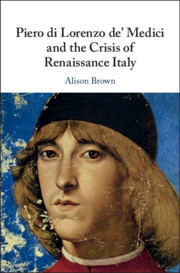Book contents
- Piero di Lorenzo de’ Medici and the Crisis of Renaissance Italy
- Piero di Lorenzo de’ Medici and the Crisis of Renaissance Italy
- Copyright page
- Dedication
- Contents
- Acknowledgements
- List of Abbreviations
- Introduction
- Part I The Early Years
- Part II Between Republicanism and Princely Rule
- Part III Piero in Power
- Part IV Piero in Exile
- 16 Perambulating Italy, 1494–1497
- 17 ‘Contamination in the Labyrinth’
- 18 The Last Years, 1498–1503
- 19 Piero’s Burial and Legacy
- Conclusion
- Bibliography
- Index
16 - Perambulating Italy, 1494–1497
from Part IV - Piero in Exile
Published online by Cambridge University Press: 20 December 2019
- Piero di Lorenzo de’ Medici and the Crisis of Renaissance Italy
- Piero di Lorenzo de’ Medici and the Crisis of Renaissance Italy
- Copyright page
- Dedication
- Contents
- Acknowledgements
- List of Abbreviations
- Introduction
- Part I The Early Years
- Part II Between Republicanism and Princely Rule
- Part III Piero in Power
- Part IV Piero in Exile
- 16 Perambulating Italy, 1494–1497
- 17 ‘Contamination in the Labyrinth’
- 18 The Last Years, 1498–1503
- 19 Piero’s Burial and Legacy
- Conclusion
- Bibliography
- Index
Summary
‘The great rebel’, as Machiavelli now called Piero, was a fugitive for the nine years between his escape from Florence on 9 November 1494 to his death by drowning on 28 December 1503. It was a time of great turbulence. The two French expeditions to claim the kingdom of Naples in 1494 and 1499 not only exiled the Medici from Florence and the Aragonese from Naples, but also destabilised the whole of Italy as they came and went. As the Florentines predicted, Piero ‘threw himself’ wherever Florence had enemies, and these enemies in turn used the Medici as ‘instruments and, as they say, a lure’, in order to foment trouble in the city and uprisings in its territory.1 Like a matador who wears out his victim by endless prodding from different flanks, Piero constantly threatened Florence as he crossed and recrossed Italy – moving from Venice to Pitigliano, Bolsena and Narni to Rome; back to Venice, then to Milan and Pisa, before returning to Rome; to Perugia, Viterbo and Bracciano, Naples and back to Rome. His relatively few surviving letters from this period initially reflect shock and self-pity for what had happened to him, then anger and alienation. More revealing of his state of mind are the poems he wrote during his exile. The two opening poems allude more obviously to his grief, his face ‘washed with tears’ as he thinks ‘of what I am and what I was’ and his one hope, if not allowed to return, of being buried in Florence with his father, ‘who once made the city so glorious and eminent’. It is the third poem, ‘Cruel, unhappy day and full of grief’, that shows the extent of his bitterness in using the unexpected images of the two exiles Thyestes and Medea (the father who ate his children and the mother who slaughtered hers) to depict the depths to which they sank and the fate of their unhappy children – perhaps with his own children in mind. Instead of returning to Florence, he died far away in southern Italy, and all ‘the great rebel’ achieved, according to Machiavelli, was ‘the burial of five citizens’, his most loyal supporters in the city, who were executed after his failed attempt to return to Florence in 1497.2 These years offer a sad but revealing coda to his early years in power.
Keywords
- Type
- Chapter
- Information
- Piero di Lorenzo de' Medici and the Crisis of Renaissance Italy , pp. 231 - 253Publisher: Cambridge University PressPrint publication year: 2020

